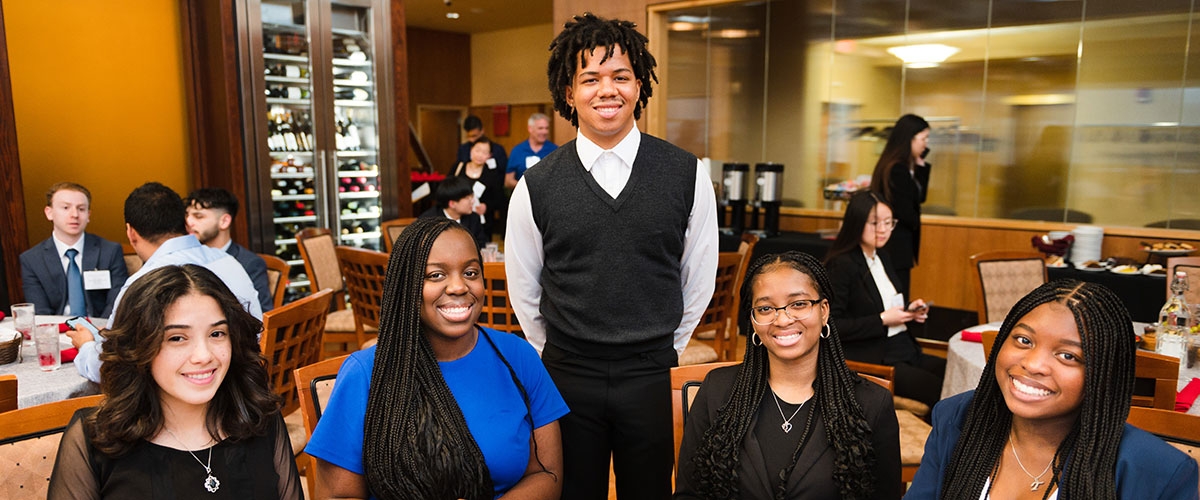
This program enrolls RBS undergraduate students who are the first in their family to attend college and connects them with full-time early career working professionals who are first generation college graduates. The program provides individual mentoring and coaching from a mentor and builds community among first-generation students at RBS seeking to develop and integrate personal, academic and career goals.
For the purpose of this program, first-generation is defined as “individuals, both of whose parents did not complete a baccalaureate degree either in this country or abroad."
Program Structure
- UFirst offers personalized, impactful, and flexible mentoring to fit RBS undergraduate students’ schedules and needs.
- Duration of the program: 1 academic year (September-May)
- Approximate Time Commitment: 10 hours total
- Program Requirements include:
- Attend program orientation
- Schedule and attend at least 2 meetings with your individual meeting per semester
- Attend 2 group mentoring sessions/workshops per semester
- Students who complete the program receive a Certificate of Achievement and an invitation to the Annual Mentoring Celebration held each spring.
Eligibility
- Be in good standing at the University
- Be an undergraduate student enrolled at RBS – Newark or New Brunswick
- Be a first-generation college student (first in your family to obtain a bachelor’s degree)
Joining UFirst
- Students can apply for the program at the start of each academic year (September).
For First Generation Undergraduate Students
- DISCOVER topics including college immersion strategies, vision-building, career-planning, business communication, etiquette, and network development
- CONNECT with other first-generation RBS students and first-generation college graduates
- GET INSPIRED by first-generation professionals by sharing personal, academic, and career goals
For First-Generation Professionals Interested in Mentoring
- GROW your network in the professional landscape
- ADVANCE your leadership skills
- SUPPORT Rutgers University (non-alumni welcome!)
Impact of Programs
- “With the UFirst Mentoring Program, I have the opportunity to be informed on different aspects of college and how I can develop my career path. Having a mentor in my career field, I am able to get personalized advice based on their previous experiences or my personal and professional skills. It also allows me to build a connection with the mentor and their network.” – UFirst First-Year Student, Finance Major, New Brunswick.
- “As a first-generation student, I was never able to turn to my family for guidance on academic or career goals. Talking to someone with a cultural understanding who has faced similar challenges as I have provides me with insight and understanding that aids me to navigate the struggles I face.” – UFirst Sophomore, Marketing Major, Newark.
Frequently Asked Questions
How do I sign up?
Students can apply for the program once the fall semester has begun. Students will receive email communications when applications open. Applying does not guarantee students a spot; administrators will review applications and send out decisions for those accepted/denied.
Do I get to choose my mentor?
Yes. The Chronus platform populates the best potential matches for students based on an algorithm that analyzes the profile responses of both students and mentors. Students will send requests to mentors they are interested in working with. While students can request mentors, mentors are also allowed to accept or decline an invitation, so we encourage students to send 2-3 simultaneous requests.
Where do the group mentoring meetings take place?
Group mentoring sessions take place in person in the RBS or, depending on the mentors’ schedules, virtually.
I’m not sure how to utilize a mentoring relationship. Will I receive guidance on this?
Yes. Orientation offers an overview of the program including advice on the mentoring relationships such as: what to discuss, goal setting, and mentoring etiquette.
Will this program help me get an internship and/or job?
Our programs are mentorship programs. Students should not expect or ask their mentors to help them get an internship/job. While the mentoring relationship may help students gain the skills and knowledge to receive an internship or job, it is not the main goal of the mentoring relationship.